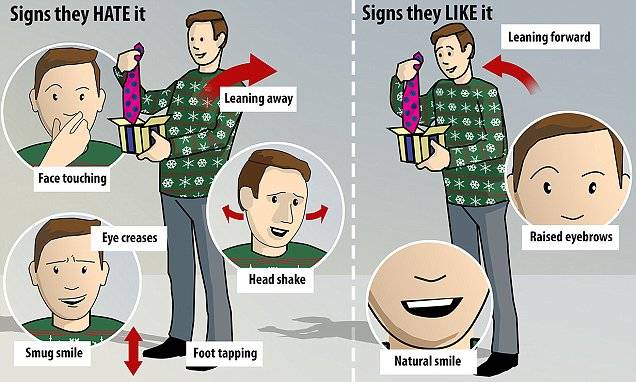One of the many great lessons I’ve taken from Tim Ferriss is the active application of the 80/20 rule to projects and endeavors. The 80/20 rule, known more formally as the Pareto Principle, states that 80% of your effects are usually generated by 20% of your inputs. For example, in B2B sales it’s often the […]![]()
Did they Really Like their Christmas Present?

Giving and receiving Christmas gifts can be a stressful nightmare but how can you tell if someone really liked their gift?
In a survey of 2,000 Brits, 65% of people confessed to pretending to like a gift to avoid hurting someone’s feelings.
The graphic above shows the body language signals to look for to see if someone does or doesn’t like their gift.
Most of us probably know how to read these signs somewhat instinctively- in a study conducted on gift giving, 680 men and women were asked to identify whether or not a recipient liked their gift. 75% of the participants were able to correctly do so. We covered this story in a past blog on Emotions in Gift Giving.
However, in this spirit of giving this holiday season, let’s remember that psychologist have also scientifically proven that one of the greatest contributing factors to overall happiness is how much gratitude you show.
It’s truly the thought that counts and expressing your appreciation for a gift (whether you truly like it or not) can lead to not only your happiness, but the gift giver as well.
Sometimes Similarities Mean More When it Comes to Persuasion
 Imagine this scene on a busy street in New York City. Two guys are walking toward each other and the following ensues:Guy 1 – Hey man, I’m from New York! Are you?Guy 2 – F%#@ you buddy. I’m from Brooklyn!Trying to connect with someone based on what you have in common – similarities – is an effective way to engage the principleof liking … most of the time.All kidding aside, trying to connect with a New Yorker in the city over the fact that you’re a New Yorker too has little meaning. That’s so, because virtually everyone else on the street could say the same thing. There’s nothing unique or different about that to bond over. However, connecting over the fact that you’re both from NYC if you were somewhere else, say California, would mean something because it’s not likely too many others could say the same thing.This came to mind recently when I thought back to a time when Jane and I were in Boston. The year was 2004 and I’d qualified to run the Boston Marathon. Never having been to Boston we decided to fly in a few days early to enjoy the city and see the sites. One site we wanted to see was the bar Cheers, the location of the famous sitcom by the same name.As you might imagine, when we arrived the bar was packed with other curious tourists. In fact it was so crowded we couldn’t get a seat near the bar. After a short while Jane said to me, “I think those people are from Southwest Pennsylvania.” She could hear a couple talking and recognized the accent because that’s where she’s from originally.Shortly thereafter Jane said, “Excuse me. I wasn’t eavesdropping but are you from Southwest Pennsylvania?” They said they were and Jane proceeded to tell them she recognized their accent because she was from Waynesburg, Pa. A conversation ensued and soon we were sitting with this couple. If you didn’t know any better you’d have thought we knew each other and were good friends.As I shared at the beginning, trying to connect on the Southwest Pennsylvania similarity would not have meant much if Jane had brought it up in Southwest Pennsylvania. However, doing so in an unfamiliar environment magnifies similarities. Strangers in a strange city feel a sense of comfort meeting people they see as similar to themselves.What does this mean for you? To build or strengthen relationships you want to look for opportunities to connect using the principle of liking. Quite often you’ll find yourself in new or unfamiliar situations so connecting on similarities will be immensely helpful. Here are some tips:If you know some people who will be in attendance at an event you’re attending, Google them to learn about them in advance. Next, make it a point to connect on anything you have in common.If you don’t know who will be attending then you want to ask good questions and demonstrate active listening skills. Here are seven non-threating, ice-breaking inquiries you might want to use:What do you do for a living?Where are you from originally?Where did you go to school?Where do you live currently?Tell me about your family.What are some of your hobbies?What’s the most interesting place you’ve traveled to?Two things will happen when you ask these questions and actively listen. First, people appreciate the sincere interest and chance to talk about themselves. Second, you learn what you have in common and can then go deeper to form connections.Sometimes similarities mean more when it comes to persuasion. Recognizing that can help you magnify the liking principle which will help you build relationships and ultimately make it easier to hear “Yes” when you need someone to help you.
Imagine this scene on a busy street in New York City. Two guys are walking toward each other and the following ensues:Guy 1 – Hey man, I’m from New York! Are you?Guy 2 – F%#@ you buddy. I’m from Brooklyn!Trying to connect with someone based on what you have in common – similarities – is an effective way to engage the principleof liking … most of the time.All kidding aside, trying to connect with a New Yorker in the city over the fact that you’re a New Yorker too has little meaning. That’s so, because virtually everyone else on the street could say the same thing. There’s nothing unique or different about that to bond over. However, connecting over the fact that you’re both from NYC if you were somewhere else, say California, would mean something because it’s not likely too many others could say the same thing.This came to mind recently when I thought back to a time when Jane and I were in Boston. The year was 2004 and I’d qualified to run the Boston Marathon. Never having been to Boston we decided to fly in a few days early to enjoy the city and see the sites. One site we wanted to see was the bar Cheers, the location of the famous sitcom by the same name.As you might imagine, when we arrived the bar was packed with other curious tourists. In fact it was so crowded we couldn’t get a seat near the bar. After a short while Jane said to me, “I think those people are from Southwest Pennsylvania.” She could hear a couple talking and recognized the accent because that’s where she’s from originally.Shortly thereafter Jane said, “Excuse me. I wasn’t eavesdropping but are you from Southwest Pennsylvania?” They said they were and Jane proceeded to tell them she recognized their accent because she was from Waynesburg, Pa. A conversation ensued and soon we were sitting with this couple. If you didn’t know any better you’d have thought we knew each other and were good friends.As I shared at the beginning, trying to connect on the Southwest Pennsylvania similarity would not have meant much if Jane had brought it up in Southwest Pennsylvania. However, doing so in an unfamiliar environment magnifies similarities. Strangers in a strange city feel a sense of comfort meeting people they see as similar to themselves.What does this mean for you? To build or strengthen relationships you want to look for opportunities to connect using the principle of liking. Quite often you’ll find yourself in new or unfamiliar situations so connecting on similarities will be immensely helpful. Here are some tips:If you know some people who will be in attendance at an event you’re attending, Google them to learn about them in advance. Next, make it a point to connect on anything you have in common.If you don’t know who will be attending then you want to ask good questions and demonstrate active listening skills. Here are seven non-threating, ice-breaking inquiries you might want to use:What do you do for a living?Where are you from originally?Where did you go to school?Where do you live currently?Tell me about your family.What are some of your hobbies?What’s the most interesting place you’ve traveled to?Two things will happen when you ask these questions and actively listen. First, people appreciate the sincere interest and chance to talk about themselves. Second, you learn what you have in common and can then go deeper to form connections.Sometimes similarities mean more when it comes to persuasion. Recognizing that can help you magnify the liking principle which will help you build relationships and ultimately make it easier to hear “Yes” when you need someone to help you. Brian Ahearn, CMCT® Chief Influence Officer influencePEOPLE Helping You Learn to Hear “Yes”.
Brian Ahearn, CMCT® Chief Influence Officer influencePEOPLE Helping You Learn to Hear “Yes”.
- « Previous Page
- 1
- …
- 261
- 262
- 263
- 264
- 265
- …
- 562
- Next Page »